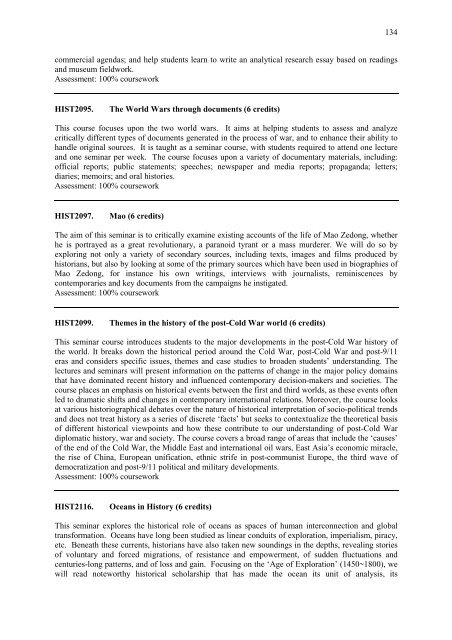(BA) (4-year-programme) - The University of Hong Kong
(BA) (4-year-programme) - The University of Hong Kong
(BA) (4-year-programme) - The University of Hong Kong
Create successful ePaper yourself
Turn your PDF publications into a flip-book with our unique Google optimized e-Paper software.
134commercial agendas; and help students learn to write an analytical research essay based on readingsand museum fieldwork.Assessment: 100% courseworkHIST2095.<strong>The</strong> World Wars through documents (6 credits)This course focuses upon the two world wars. It aims at helping students to assess and analyzecritically different types <strong>of</strong> documents generated in the process <strong>of</strong> war, and to enhance their ability tohandle original sources. It is taught as a seminar course, with students required to attend one lectureand one seminar per week. <strong>The</strong> course focuses upon a variety <strong>of</strong> documentary materials, including:<strong>of</strong>ficial reports; public statements; speeches; newspaper and media reports; propaganda; letters;diaries; memoirs; and oral histories.Assessment: 100% courseworkHIST2097.Mao (6 credits)<strong>The</strong> aim <strong>of</strong> this seminar is to critically examine existing accounts <strong>of</strong> the life <strong>of</strong> Mao Zedong, whetherhe is portrayed as a great revolutionary, a paranoid tyrant or a mass murderer. We will do so byexploring not only a variety <strong>of</strong> secondary sources, including texts, images and films produced byhistorians, but also by looking at some <strong>of</strong> the primary sources which have been used in biographies <strong>of</strong>Mao Zedong, for instance his own writings, interviews with journalists, reminiscences bycontemporaries and key documents from the campaigns he instigated.Assessment: 100% courseworkHIST2099.<strong>The</strong>mes in the history <strong>of</strong> the post-Cold War world (6 credits)This seminar course introduces students to the major developments in the post-Cold War history <strong>of</strong>the world. It breaks down the historical period around the Cold War, post-Cold War and post-9/11eras and considers specific issues, themes and case studies to broaden students’ understanding. <strong>The</strong>lectures and seminars will present information on the patterns <strong>of</strong> change in the major policy domainsthat have dominated recent history and influenced contemporary decision-makers and societies. <strong>The</strong>course places an emphasis on historical events between the first and third worlds, as these events <strong>of</strong>tenled to dramatic shifts and changes in contemporary international relations. Moreover, the course looksat various historiographical debates over the nature <strong>of</strong> historical interpretation <strong>of</strong> socio-political trendsand does not treat history as a series <strong>of</strong> discrete ‘facts’ but seeks to contextualize the theoretical basis<strong>of</strong> different historical viewpoints and how these contribute to our understanding <strong>of</strong> post-Cold Wardiplomatic history, war and society. <strong>The</strong> course covers a broad range <strong>of</strong> areas that include the ‘causes’<strong>of</strong> the end <strong>of</strong> the Cold War, the Middle East and international oil wars, East Asia’s economic miracle,the rise <strong>of</strong> China, European unification, ethnic strife in post-communist Europe, the third wave <strong>of</strong>democratization and post-9/11 political and military developments.Assessment: 100% courseworkHIST2116.Oceans in History (6 credits)This seminar explores the historical role <strong>of</strong> oceans as spaces <strong>of</strong> human interconnection and globaltransformation. Oceans have long been studied as linear conduits <strong>of</strong> exploration, imperialism, piracy,etc. Beneath these currents, historians have also taken new soundings in the depths, revealing stories<strong>of</strong> voluntary and forced migrations, <strong>of</strong> resistance and empowerment, <strong>of</strong> sudden fluctuations andcenturies-long patterns, and <strong>of</strong> loss and gain. Focusing on the ‘Age <strong>of</strong> Exploration’ (1450~1800), wewill read noteworthy historical scholarship that has made the ocean its unit <strong>of</strong> analysis, its
















